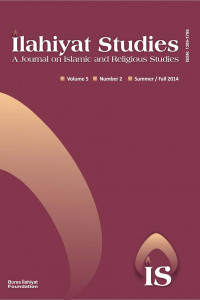The Politics of Fiṭra: On Ibn Taymiyya’s Epistemological Optimism: An Essay Review on Politics, Law, and Community in Islamic Thought: The Taymiyyan Moment, by Ovamir Anjum
Öz
First paragraph: The assertion that theology was the most powerful driving force in the politics of the early Muslim community seems to be an axiom that requires no proof. The birth of the various schisms in the Muslim community (al-umma), along with the theological debates that accompanied them, were thoroughly studied by medieval and modern scholars alike. In describing the politico-theological groups, such as the Khārijites or the Qadarites, historians of the classical period emphasized that the concepts of divine justice and human free will were keyplayers in the dramatic chain of events that led to the emergence of these political parties. Attention has also been given to the theological concepts that the caliphs, with the help of the ʿulamāʾ, promoted to stabilize their status and legitimize their rule. Thus, impactful events, such as al-Maʾmūn’s miḥna (between the years 833 and 847), were closely connected to the heated debates between the traditionalists and the rationalists on the concept of “the uncreated Qurʾān.” In sum, the connection of simplistic theological formulae with the inception of early political thought in Islam was always surface level; the connection between hairsplitting theological discussions and later political thought in Islam, however, was not. Ovamir Anjum’s Politics, Law, and Community in Islamic Thought: The Taymiyyan Moment fills this gap. The entanglements of politics and high-level theological thought are fully revealed in Anjum’s multi-layered and discursive monograph.
The Politics of Fiṭra: On Ibn Taymiyya’s Epistemological Optimism: An Essay Review on Politics, Law, and Community in Islamic Thought: The Taymiyyan Moment, by Ovamir Anjum
Öz
First paragraph:
The assertion that theology was the most powerful driving force in the politics of the early Muslim community seems to be an axiom that requires no proof. The birth of the various schisms in the Muslim community (al-umma), along with the theological debates that accompanied them, were thoroughly studied by medieval and modern scholars alike. In describing the politico-theological groups, such as the Khārijites or the Qadarites, historians of the classical period emphasized that the concepts of divine justice and human free will were keyplayers in the dramatic chain of events that led to the emergence of these political parties. Attention has also been given to the theological concepts that the caliphs, with the help of the ʿulamāʾ, promoted to stabilize their status and legitimize their rule. Thus, impactful events, such as al-Maʾmūn’s miḥna (between the years 833 and 847), were closely connected to the heated debates between the traditionalists and the rationalists on the concept of “the uncreated Qurʾān.” In sum, the connection of simplistic theological formulae with the inception of early political thought in Islam was always surface level; the connection between hairsplitting theological discussions and later political thought in Islam, however, was not. Ovamir Anjum’s Politics, Law, and Community in Islamic Thought: The Taymiyyan Moment fills this gap. The entanglements of politics and high-level theological thought are fully revealed in Anjum’s multi-layered and discursive monograph.
Anahtar Kelimeler
Politics Law Community in Islamic Thought The Taymiyyan Moment
Ayrıntılar
| Birincil Dil | İngilizce |
|---|---|
| Konular | Din Araştırmaları |
| Bölüm | Reviews |
| Yazarlar | |
| Yayımlanma Tarihi | 8 Temmuz 2015 |
| Gönderilme Tarihi | 4 Ocak 2015 |
| Yayımlandığı Sayı | Yıl 2014 Cilt: 5 Sayı: 2 |


